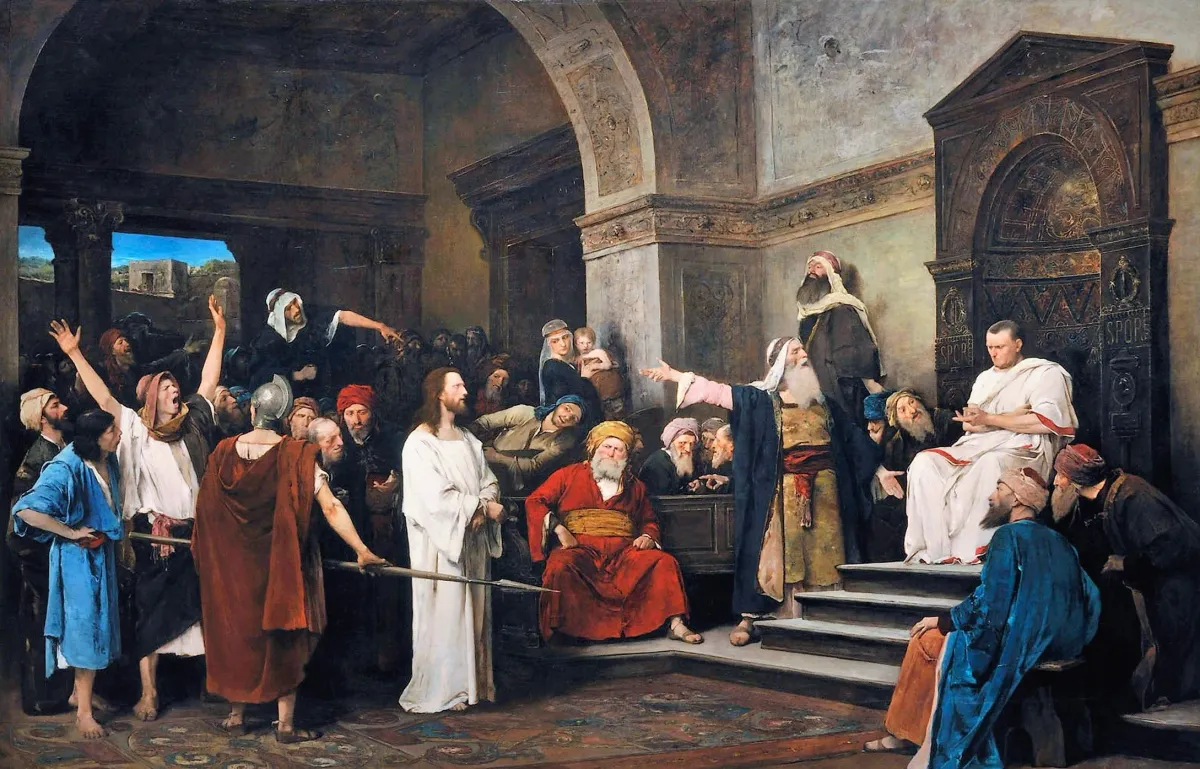Jesus Didn't Kill Himself
At Calvary, Jesus was executed by the earthly powers of his day. "Atonement" cannot be sanitized of this political and historical reality.

Jesus didn't kill himself.
But the way we sometimes talk about "atonement" suggest that he might as well have.
That's because most back-of-the-napkin atonement theories – the stilted kind we might cook up while sitting in Easter service trying to justify our being there – are really nothing more than this: God demands blood compensation for sin. Jesus, therefore, simply needed to die – like a lamb offering, say, slaughtered ritually by a priest who harbors no malice against it.
And if this is all there is to it, Jesus might as well, then, have killed himself. Or been ritually slaughtered, say, by well-meaning zealots trying to satisfy Yahweh's blood quota. The cosmic result would have been the same.
But this kind of death would be vapid, and I think that's obvious to most serious inquirers. Could Jesus really have saved the cosmos by simply slitting his own throat? By dying in an accident? It doesn’t seem right.
Exactly why this feels wrong, though, isn't as forthcoming. And I suspect that’s because of just how deeply-rooted are so many impoverished "atonement theories" in our religious psyches. When we've been lazy about making any actual, intuitive sense of how "salvation" can come through the violent death and mysterious resurrection of Jesus of Nazareth (say, when we consent to "accept" the whole thing on “blind faith,” whether it actually compels us or not), we end up with a model that can’t convincingly explain all that we allege is true about what happened in Jerusalem – and throughout the cosmos – sometime around 34 AD.
On this Good Friday, I think it's worthwhile to try and fix this.
How Jesus Died
"Jesus Christ laid down his life for us." (I John 3:16)
In every sense of the word, Jesus was executed as a criminal.
This happened, of course, after he was condemned by the powers that be – first by the Sanhedrin, Israel's religious leaders, then by Herod, Israel's king, and finally by Pontius Pilate, the Roman governor of Israel and the enslaved nation’s ultimate political authority.
And this all happened quickly – over the course of one evening and one morning. I imagine that few onlookers had any time to fully digest what was happening or, before Jesus faced Pilate, how this might end. Indeed, probably most of Jesus' posse slept through almost all of this. Even the disciples themselves had to be roused from sleep when Jesus was arrested by Jewish and Roman authorities in Gethsemane, his location and security having been compromised by his disciple, Judas Iscariot.
After his show trials and a brutal flogging, Jesus was crowned with thorns and affixed to a cross that he'd been ordered to carry, himself, up to Golgotha. There had been a chance that he'd be released at the last minute – Pilate, finding no fault in what little he knew of Jesus, offered to release him. But the crowds present at the time asked, instead, for Barabbas (who was released). That afternoon, Jesus hung on his cross for about six hours, then died. Afterwards, a member of the Sanhedrin who, presumably, had witnessed Jesus' trial the night prior but, according to Luke’s Gospel, "had not consented" to indicting Jesus, asked Pilate for the dead body and had it buried it in a tomb nearby.
This is how Jesus died. He was dubiously condemned under cover of darkness. He did not attempt to defend himself nor, given the circumstances, did he have any honest defense to offer. He was flogged and humiliated, then crucified alongside two other criminals. He was buried without a funeral.
Jesus died as an "outlaw." He was persecuted for his teachings, betrayed by his friends, humiliated before crowds, and executed in the same manner as were thieves, rapists, and murderers.
What This Was Not
Decades after Jesus' death (and alleged resurrection from the dead three days later), many of his followers would explain his death as an “atoning” sacrifice.
The Apostle Paul, most notably, elucidated an arguably comprehensive theory of "atonement" in his Letter to the Romans: “For all have sinned and fall short of God's glory, Being made upright as a gift by his grace, through the manumission fee paid in the Anointed One, Jesus: Whom God set forth as a place of atonement through faith in his blood, as a demonstration of his justice through the dismissal of past sins.” Elsewhere in Romans, Paul writes: “the Anointed died on our behalf. So much the more, therefore, shall we – having been vindicated by his blood – be saved from the indignation.” And the author(s) of the Gospel of John, likely writing several decades after Paul, report Jesus as having said to his disciples “I am the good shepherd. The good shepherd lays down his life for the sheep.”
It's notable, however, that Jesus is nowhere recorded as having outlined any proper atonement theory, even as he alludes to his death as constituting a sort-of gift for Israel. The closest he comes is in Mark 10 when he says, “For even the Son of Man came … to give his soul as the price of liberation for many.” Besides that, he indeed prophesies his own death (and resurrection), but does not indicate that his blood was demanded by Yahweh.
But nevertheless, it's clear, I think, that, for the earliest church, Jesus-as-atoning-sacrifice was an integral – even fundamental – way of understanding the significance of the "Gospel." It's what Paul seems to have preached (alongside, of course, Jesus' resurrection) to his many church plants. And the idea, of course, would have fit snugly into a Jewish religious paradigm, wherein Yahweh's wrath is satisfied, at least in part, by ritual blood sacrifice. If Jesus was sinless, as Paul (a Jewish scholar) asserts, then his sacrifice allegedly could, according to a certain logic, atone for all of Israel, and even for the entire human race – a vastly more efficacious offering than ritual animal sacrifices, which were apparently so deficient as to require regular “renewal” during Passover (and other days). The idea is that, by “laying down his life” and dying, Jesus would permanently satiate Yahweh's thirst for justice and restore a sinless, Edenic balance to Yahweh’s relationship with man. Jesus is like a “lamb for slaughter” and atones, by his suffering, for all of the human race and, arguably, the entire fallen cosmos.
But what does it really mean that Jesus "laid down his life?" Is that just a way of saying he died, and that's it? His breath expired? His brain ran out of oxygen? When "Christ gave himself up for us," was he simply paying a debt with his blood? And would that debt have been paid no matter how Jesus might have died?
Those are interesting questions, to me. On some margin, it's maybe silly – with it, we're dealing in counterfactuals. The story we actually have is of Jesus executed. He didn’t simply die of a heart attack and "atone" for our sins that way. He didn't hang himself or offer himself up to paranoid zealots who, like Jonah's shipmates, were willing to see if killing him would force Yahweh's hand. Nor did he turn himself in to the authorities or ask to be executed. He did not commit some new crime that would unambiguously seal his fate.
It may seem like I make almost no progress by answering my questions this way, but I suggest this: What definitely did not happen at Calvary was self-immolation. Jesus did not give himself up to die except insofar as he refused to obey the Sanhedrin and cease ministering. Jesus was violently killed as a young man by those around him at the height of his career. It's not good that it happened. Ideally it would never have happened. We should lament that those around Jesus did not all conform to his way of life, give up their claims to earthly power, and dedicate themselves to living for each other. Jesus' death was not a good thing.
Jesus did not kill himself. He did not satisfy Yahweh's wrath simply by dying as did the calves, lambs and doves brought by the Jews to the Temple for sacrifice that Passover week.
The Context is Not Arbitrary
We cannot separate what happened at Calvary from why it happened. Jesus was executed because he threatened the extant political and religious order. His death was of cosmic significance because of how exactly it happened.
Though many thousands of ritual sacrifices were being offered at the Temple that week before Passover, what happened during Jesus' trial and death was not, itself, a religious ritual – at least, not in any sense that would have been recognizable to first-century Israelites.
Jesus was betrayed by his disciple Judas Iscariot for money. Those who offered the money wanted Jesus silenced. He was drawing large crowds and inspiring people throughout Galilee and Judea with unconventional ideas. "The last shall be first," he taught. "The Sabbath was made for man, not man for the Sabbath." They were also disturbed by Jesus' alleged miracles (although such reports were not uncommon). Many people – both Jews and Gentiles – were claiming that Jesus healed their physical and spiritual ailments. And, of course, he'd publicly raised Lazarus from the dead just a few days prior.
But his greatest crime was that of which they accused him on the evening before his death – blasphemy against the established orthodoxy.
Some months prior to his Passion, Jesus had a public spat (recorded in John 10) with some Judeans in the Temple. "If you are the Anointed, tell us forthrightly," they insisted. "I have told you, and you do not have faith," Jesus replied. They took up stones to kill him, but he replied "Is it not written in your Law 'I said, "You are gods?" If he called gods those to whom God's logos came, and the scripture cannot be dissolved, How is that, because I have said I am the Son of God, you say, 'You blaspheme' to one whom the Father sanctified and sent out into the cosmos?"
At this, Jesus, standing in the temple, was seized and would likely have been tried and put to death right then. But the text says he "slipped away," for the time being. But when he was finally brought before the Sanhedrin later, the High Priest asked Jesus what he'd been asked before, "Are you the Messiah, the Son of the Blessed One?" Jesus answered, "I am. And you will see the Son of Man sitting at the right hand of the Mighty One and coming on the clouds of heaven."
It was at this comment that the High Priest became enraged, tore his clothes, and decided to send Jesus to Pilate.
There is no question that these events were decidedly political and personal. Jesus and his fast-growing movement threatened the fragile civil order of his day. His teachings inspired some kind of fervor and action amongst people, especially in the lowest classes – fishermen, widows, Samaritans, and Gentiles – who, per Jewish custom, should avoid this kind of "extra-curricular" spiritual enthusiasm (not in the least because it makes their Roman overlords nervous).
Jesus was executed by the powers that be in like manner to how many other rabble-rousers had been executed before him. He was victimized by those with civil and religious authority (one-in-the-same, mostly, in first-century Palestine). He died as a sort-of martyr for the cause of God's undying love for the lowly and "unclean," and God's special unity with him.
Again, he did not kill himself. Insofar as Jesus' death is supposed to "atone" for our sins, the fact of how it happened – the unchangeable historical context – is fundamental. Jesus atones specifically as a victim of the powers that be – it cannot ever be any other way. In this sense, the "atonement" Jesus offers for sin is, in a sense, effectuated by the world’s hatred for him.
But can hatred really bring about God's will? Does God use hate to bring about good? I think not. And this is why, taking things one step further, the atonement isn't "effectual" insofar as Jesus is simply a "higher-order" burnt offering. Jesus' faithfulness on Good Friday and his mysterious resurrection two days later revealed what is and will always be true about God’s love for humanity: it is undying and cannot be permanently obstructed by any human power. Jesus’ death was the fullest demonstration of divine love, and thereby "atones" not merely through ritual, but through self-giving love in the face of evil. Insofar as we're willing to observe and, somehow, participate in it – to try and see, for ourselves, what lies inherent in the story as it happened – we can experience this atonement for ourselves.
Had Jesus simply lived "sinlessly" and then taken his own life (or been ritually sacrificed in order to satisfy some divine blood quota), the story, and the event itself, would lose its power. His "sacrifice" wouldn't confront sin, or anything. It wouldn't expose the worldly powers. It wouldn't illuminate just how deep is the rot that runs through our political and religious institutions, and our hearts. Without the injustice, there is no salvation. Without the scandal, no Gospel. Without the evil powers exposed in this particular way, there is no cross worth bearing.
It's easy enough to retrofit a simplistic "spotless lamb" sacrifice onto the story of Jesus – to force obtuse "atonement" theories into the narrative that posit Jesus as, say, a "higher-order" burnt offering, and nothing more. But insofar as those do not source the cause of Jesus' death solely in the minds and hearts of those who had the power to kill him, that theory is meaningless. We can't take advantage of the image of Jesus' "victory over sin" whilst sanitizing his death from its very-human historical and political context, wherein that sin is what killed him.
Inviting Atonement & the Meaning of Good Friday
Good Friday (and Easter Sunday) are about salvation, but they're not just about what happened in the past or what happens "metaphysically" or in the heavens. They’re about us in the most intimate way – our broken systems, our power politics, the seemingly endless capacity of our fear to have us condemn each other. And it’s about the salvation we can experience by participating in the story ourselves, again and again.
A friend of mine once suggested that our Good Friday observations today, even 2,000 years after the fact, are the funeral Jesus never had. He died mostly alone – tortured, mocked, discarded quickly. Just a few friends and his mother watched him die. So each year, we gather to do what wasn't done then. We mourn for the crucified slave. We remember. And we genuinely participate in Jesus' funeral.
Because that's the point – not just to believe, but to participate. I really don't think it’s all that mysterious. It feels demanding, maybe, to give so much attention to something we know so little about, but I think the stakes and the story, if we're willing to entertain them, are sufficiently compelling. And they call us to become part of it all – to carry his cross and bear his wounds. To join Christ's body – not as an abstract mental model, but as a way of life. As Paul writes: "You are the Anointed's body."
The same evil impulses that killed Jesus are at work today. We're not just far-off spectators. The powers that be (including, yes, the margins of authority over others that we, ourselves, wield and abuse) still crucify the innocent, and we're complicit when we stay silent or do nothing to temper our own twisted lusts. "Atonement" isn't a one-time transaction – it's a way of life, and it's effectuated insofar as we confront those powers in our world and within ourselves.
So on Good Friday, don't just nod at a "paid debt." Mourn Jesus. Bear his coffin. Carry his cross for him. Reject the systems, and the inclinations within you, that crush the poor, lowly, and innocent.
The circumstances of Jesus' death are severe and ask more of us than mere gratitude. The scandal of this day calls us to a heightened awareness of our propensity for evil, and to be transformed into something good.





